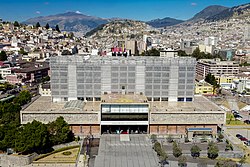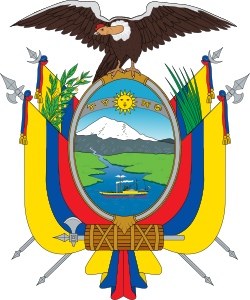You can help expand this article with text translated from the corresponding article in Spanish. (April 2025)Click [show] for important translation instructions.
|
National Assembly Asamblea Nacional | |
|---|---|
| National Assembly (2025–present) | |
 | |
| Type | |
| Type | |
| History | |
| Founded | September 28, 2008 |
| Preceded by | National Congress |
| Leadership | |
1st Vice President | |
2nd Vice President | |
| Structure | |
| Seats | 151 [a] |
 | |
Political groups | Government (66)
Independents (19) [1] Opposition (66) |
| Elections | |
Last election | 9 February 2025 |
Next election | By 2029 |
| Meeting place | |
 | |
| National Assembly Building Avenida 6 de Diciembre y Piedrahita Quito, Pichincha, Ecuador | |
 | |
| Interior of National Assembly | |
| Website | |
| Official website | |
 |
|---|
The National Assembly (Spanish : Asamblea Nacional) is the unicameral legislature of Ecuador. It replaced the National Congress in 2009 following reforms under the 2008 Constitution. [4] Within Ecuador, the National Assembly has the power to pass laws, while appointment of judges to the National Court of Justice is done by a separate Judicial Council. [5]


